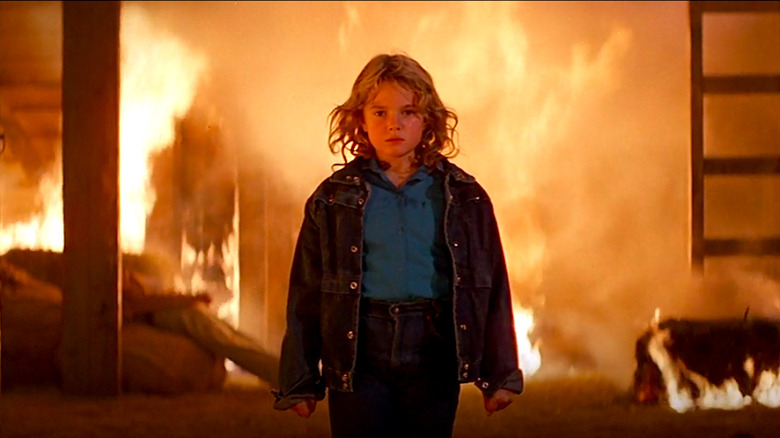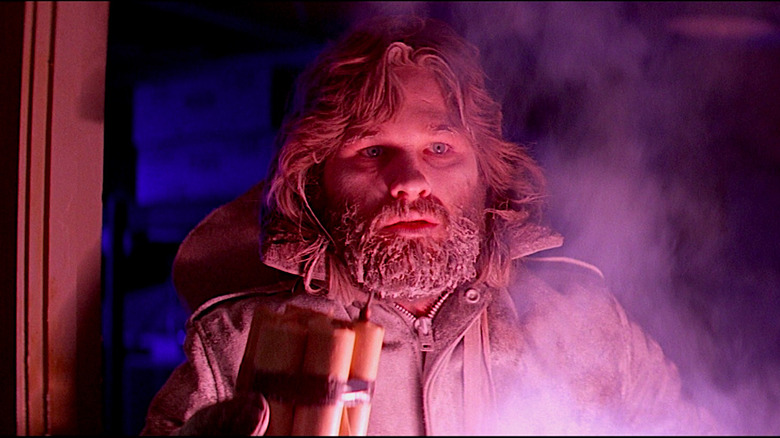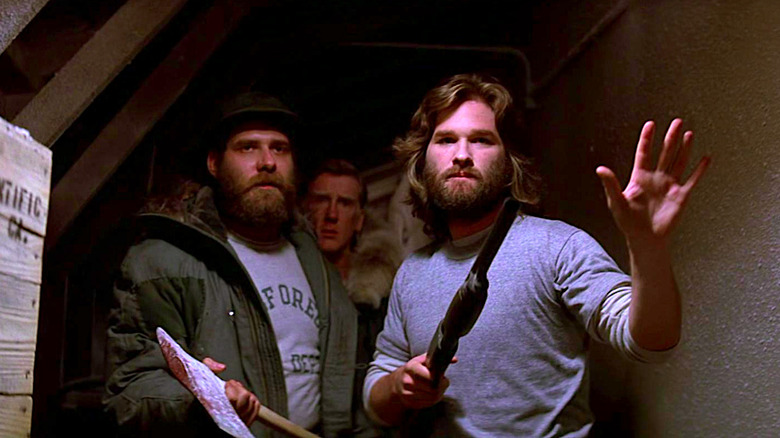How The Thing Got John Carpenter Fired From Stephen King's Firestarter
John Carpenter will go down in history as one of the greatest filmmakers of all time. He is the man responsible for giving us the delectable "shape" of Michael Meyers who changed the face of horror with nothing but a kitchen knife and one terrifying Halloween night in Haddonfield, Illinois. He is the man inviting us to "chew bubblegum and kick ass" with Roddy Piper in "They Live," and he is the man pushing us to get out of a dystopic New York alive alongside the coolest of cools, Snake Plissken, in "Escape from New York." In short, he has created some of the best and most beloved films of the last 30+ years. For fans of his work, it would be blasphemous to deny Carpenter a chance to make any film he wanted. However, wherever there are fans, there are also doubters, and unfortunately for Carpenter, the doubters got the final word on his chance to direct the film adaptation of Stephen King's "Firestarter."
"Firestarter" tells the story of Charlie McGee (Drew Barrymore), a young girl blessed with pyrotechnic abilities who's wanted by the United States government, as all of those blessed with pyrotechnic abilities are. It's the eighth of King's books to be adapted for the big screen, and when it came time to turn the book into a movie, Carpenter was the first man that Universal Pictures thought of to direct it. At the time, Carpenter was hard at work on another, very different film — a remake of the 1951 movie, "The Thing from Another World," rebranded as just "The Thing." But when "The Thing" was officially released to a whole host of audiences and critics who absolutely hated it (if you can believe that), Universal Pictures began to panic. Suddenly, Carpenter was dropped from "Firestarter," and the world rotated backwards on its axis. Okay, not really. But just what was so upsetting about "The Thing" that it made Universal Pictures question their initially brilliant choice for a director?
The Thing Had Trouble Assimilating Into the Hearts of Critics
If you're familiar with "The Thing," then you know it's one chilly movie. The film tells the story of a group of American men stationed at a research center in Antarctica who have the unfortunate luck of encountering a shape-shifting alien that slowly assimilates into their entire team, killing them one-by-one. The movie is brilliant for its suspense and spiral into madness, as well as its amazing practical effects by Rob Bottin. Kurt Russell brings a cooly composed insanity to his role as R.J. MacReady, the groups unofficial leader, and Keith David is phenomenal as Childs, the outpost's mechanic and one of the film's two survivors along with MacReady. The movie immediately sweeps you up in its mesmerizing atmosphere of below zero temperatures, puffy parkas, and a heavily relied upon flamethrowers. It's a true horror classic, but unfortunately, upon its initial release, the critics didn't feel this way at all.
"The Thing" made its official debut during the summer of 1982. If summer seems like kind of a strange time to release a movie set entirely on the frigid continent of Antarctica, you wouldn't be wrong. Perhaps the movie's chilly temperatures were supposed to inspire a sort of vicarious relief from the sweltering summer heat, but the movie really does little to garner a reaction of serenity when you watch it, so that's kind of a moot point.
At the time of its release, Universal Pictures had already put out a very different alien movie a few weeks before, Steven Spielberg's classic, "E.T. the Extra-Terrestrial." This film was immediately embraced by audiences and critics alike so that when Carpenter's much darker alien movie burst its way onto the screen, people were not as pleased. They wanted the likeable aliens, not ones that spit sinewy tentacles and cut off your hands with their chest teeth.
Many critics felt "The Thing" was plotless, boring, and too cynical to be enjoyable, and audiences felt similarly. Because of this, Universal Pictures didn't have as much faith in Carpenter, and they began questioning his ability to make successful movies. If "The Thing" performed that badly, then what's to say his adaptation of "Firestarter" would be any different? Suddenly, the Hollywood powers that be were faced with a difficult decision: allow Carpenter to continue and risk another flop, or find another filmmaker willing to take on the role.
Trading a Cold Movie for Cold Feet
Universal Pictures ultimately decided to drop Carpenter from the "Firestarter" project, but not in the way you might expect. In an interview with Bill Phillips, the screenwriter who Carpenter chose to work with him on "Firestarter," Phillips sheds light on what actually happened during Carpenter's fall from grace. He states:
"John had a "pay-or-play" deal, which meant that whether Universal made the film or not, he would get paid (it's a normal deal for talent with clout – to get and hold their attention.) When the marketing folks at Universal got cold feet because "The Thing" didn't do well at the box office and Stephen King films were clogging up the pipeline and not doing very well... They decided that since John is very good at delivering low budget films, they would cut the budget from $27 million to $15 million. Since John didn't have to agree to that, he didn't."
Basically, Universal got Carpenter to leave by slashing his budget to an unreasonably low amount. But hey, that's Hollywood for you! Carpenter still walked away with a paycheck, which, according to Phillips, he used to buy "a Bell-Jet Long Ranger Helicopter that he later rented out to the L.A. Olympics." Talk about retail therapy!
"Firestarter" went on to be directed by Mark L. Lester. Stephen King, who had previously been behind the choice of Carpenter to direct the film, has famously described the adaptation as "flavorless" and "like cafeteria mashed potatoes." Ironically, the film made slightly less at the box office than "The Thing," and today, it's Carpenter's chilly trip into the depths of Antarctica that has solidified itself as a true sci-fi horror masterpiece.
For those wondering if Carpenter ever got a chance to adapt another of King's works, the answer is yes. Very soon after Universal dropped him from "Firestarter," Columbia Pictures put him, along with Phillips, in charge of writing and directing the adaptation of King's "Christine." While "Christine" wasn't an immediate home run, it has held up significantly better amongst fans and critics alike than "Firestarter," leaving all of us to wonder about what a Carpenter-directed "Firestarter" might have looked like. Alas, we will never get to see it, but he'll be providing the score for the upcoming remake of "Firestarter." Regardless, I'll take a flame-throwing Kurt Russell over a fiery Drew Barrymore any day.


